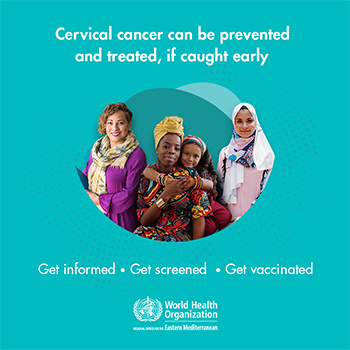Cervical cancer is one cancer we can actually eliminate: it’s time to do it
11 January 2023 – The World Health Organization (WHO) Regional Office for the Eastern Mediterranean formally launched today the Regional Cervical Cancer Elimination Strategy for the Eastern Mediterranean at a hybrid press conference hosted by WHO leaders and joined by women who have survived cervical cancer, advocates fighting the disease and high-level speakers. The event introduced the “90-70-90” targets set by the strategy: for countries to achieve 90% human papillomavirus (HPV) vaccination coverage for girls by age 15, 70% screening coverage for women by ages 35 and 45, and 90% treatment for cervical pre-cancer and management for women with cancer by 2030.
 The regional cervical cancer elimination strategy builds on the Global Strategy to Accelerate the Elimination of Cervical Cancer as a Public Health Problem, adopted by WHO Member States in 2020, which proposes: a world where cervical cancer is eliminated; a threshold of 4 per 100 000 women-years for elimination; and the 90-70-90 targets to be met by 2030 for countries to be on the path towards cervical cancer elimination within a few generations.
The regional cervical cancer elimination strategy builds on the Global Strategy to Accelerate the Elimination of Cervical Cancer as a Public Health Problem, adopted by WHO Member States in 2020, which proposes: a world where cervical cancer is eliminated; a threshold of 4 per 100 000 women-years for elimination; and the 90-70-90 targets to be met by 2030 for countries to be on the path towards cervical cancer elimination within a few generations.
“The regional cervical cancer elimination strategy has been adapted to the religious, cultural, social, economic and geographical contexts in the Eastern Mediterranean Region,” says Dr Ahmed Al-Mandhari, WHO Regional Director for the Eastern Mediterranean.
He adds: “Implementation of widespread vaccination, screening and early diagnosis has been limited in many countries of the Region. We applaud those countries in the Region that have initiated efforts to support cervical cancer elimination, and encourage others, especially our high-burden countries, to take immediate action. The context-driven regional strategy has the necessary technical tools and guidelines to help countries widely vaccinate, screen and diagnose to end needless suffering from a cancer that is both preventable and curable within a few generations”.
Cervical cancer is the sixth most common cancer in women in the WHO’s Eastern Mediterranean Region. In 2020, an estimated 89 800 women were diagnosed with cervical cancer in the Region and more than 47 500 women died from this preventable disease.
Cervical cancer develops in a woman's cervix (the entrance to the uterus from the vagina). Almost all cervical cancer cases (99%) are linked to infection with high-risk HPV. Although most infections with HPV resolve spontaneously and cause no symptoms, persistent infection can cause cervical cancer in women.
“January is Cervical Cancer Awareness Month. It is a perfect opportunity for us and our partners to galvanize joint efforts through this regional strategy, and jointly work towards eliminating cervical cancer and raising awareness about cervical cancer and HPV vaccination”, explains Dr Rana Hajjeh, Director of Programme Management at the WHO Regional Office for the Eastern Mediterranean.
She adds: “When detected early and managed effectively, cervical cancer is one of the most successfully treatable forms of cancer. Cancers diagnosed in late stages can also be controlled with appropriate treatment and palliative care. With a comprehensive approach to prevent, screen and treat, cervical cancer can be eliminated as a public health problem within a few generations.”
The regional cervical cancer elimination strategy arrives at a time when the world continues to recover from the COVID-19 pandemic and substantial disruptions to essential health services persist.
Dr Al-Mandhari concludes: “During Cervical Cancer Awareness Month and beyond, let us work together to build back healthier communities for all by all, through the implementation of the regional strategy to improve access to HPV vaccination, screening, treatment for cervical pre-cancer and management of cervical cancer by 2030 and eliminate cervical cancer within a few generations”.
For more details, visit the Cervical Cancer Awareness Month website: www.emro.who.int/ncds
For media queries, contact: Ms Nisreen Abdel Latif, WHO Communications. Email:


